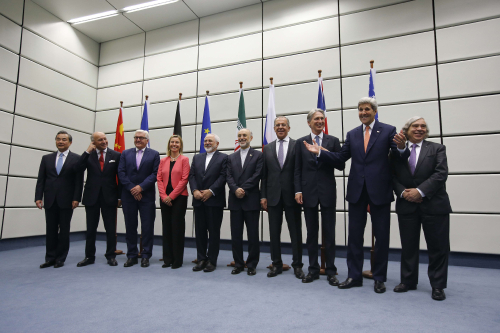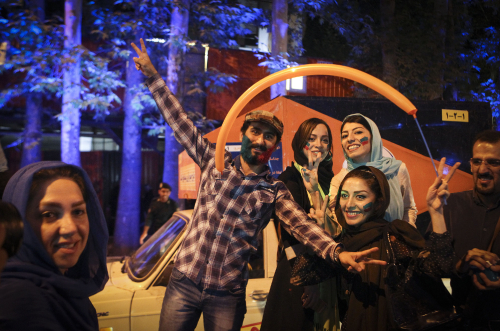|
 |
|
Negotiators of the Iran nuclear deal pose for a group photo at the United Nations building in Vienna, Austria, on July 14 (CFP) |

U.S. President Barack Obama continues a good month with a "historic" deal reached on Iran's nuclear program in mid-July. The incident marked a breakthrough in diplomatic relations immediately compared to Richard Nixon's establishment of ties to China more than 40 years ago and was labeled a "leap of faith" that has the possibility to alter the course of world peace.
The agreement does not seek to stop Iran's course to become a nuclear power--it merely attempts to delay the threat until Western powers can restructure the deeply adversarial nature of relations between Iran and the United States. Its success remains to be seen, but even critics agree that the deal marks the sunrise of a new era.
"Today, after two years of negotiation, the United States, together with the international community, has achieved something that decades of animosity has not: a comprehensive long-term deal with Iran that will prevent it from obtaining a nuclear weapon," Obama said from the White House, with Vice President Joe Biden at his side.
Iran, for its part, will receive relief from economic sanctions while being allowed to continue its atomic power program in exchange for limits on the weaponization of its nuclear activities. Yukiya Amano, the chief of the International Atomic Energy Agency, said he had signed a "roadmap" with the Iranian Government "for the clarification of past and present outstanding issues regarding Iran's nuclear program."
With the announcement of the accord, notes The New York Times, Obama has now made major strides toward fundamentally changing the American diplomatic relationships with three nations: Cuba, Iran and Myanmar. Of the three, Iran is the most strategically important; it is the only country with a nuclear program, and it is still on the State Department's list of state sponsors of terrorism.
Yet will Obama be known as a peacemaker or an appeaser to one of the world's most contentious countries? When Obama was running for office eight years ago, he pledged to talk to countries like Iran and establish relations--to shake hands if the enemy would unclench his fist. It was a statement universally derided by Republican opponents and even some in Obama's own party. Today, however, the United States has reopened its embassy in Cuba and has the near-impossible deal in hand to place some limits on Iran's nuclear ambitions. Diplomacy has won out over force.
 |
|
People celebrate in Tehran after a nuclear deal was reached between Iran and six major world powers in Vienna on July 14 (XINHUA) |
An unclear future
As the country heads into another electoral cycle, the future of American diplomacy is once again up in the air. How will the United States confront its enemies in the coming decade? Diplomatic successes like the one reached with Iran give hope that peace will at least be given half a chance before military interventions are used.
"Part of our goal here has been to show that diplomacy can work," President Obama said in an interview with The New York Times columnist Thomas L. Friedman. "It doesn't work perfectly. It doesn't give us everything that we want." But, he added, "What we can do is shape events in ways where it's more likely that problems get solved, rather than less likely, and that's the opportunity we have now."
Critics don't see it that way, and compare the deal to Neville Chamberlain's Munich Agreement with Adolf Hitler in 1938, which paved the way for global war.
"The president disagrees with himself--everything that's in this deal is what he said he would not do," said Danielle Pletka, a national security scholar at the conservative American Enterprise Institute. "The analogies to Chamberlain are much too facile, but I do think at a certain moment he needed to stop and say to himself, 'Why have I given on all of the things I said I wouldn't give on?' And the answer is because ultimately the deal itself became more important than what was in it."
Israeli Prime Minister Benjamin Netanyahu was forceful in his condemnation of the deal, calling it a "historic mistake for the world."
"Far-reaching concessions have been made in all areas that were supposed to prevent Iran from obtaining nuclear weapons capability," Netanyahu said. "In addition, Iran will receive hundreds of billions of dollars with which it can fuel its terror machine and its expansion and aggression throughout the Middle East and across the globe."
Obama said Israel concerns were "legitimate" with groups like Hezbollah aiming "tens of thousands of missiles" at Israel.
"So [Israel is] not just being paranoid," Obama said. "Iran is acting in an unconstructive way, in a dangerous way in these circumstances. What I've simply said is that we have to keep our eye on the ball here, which is that Iran with a nuclear weapon will do more damage, and we will be in a much worse position to prevent it."
In the event that Iran violates the agreement, there are provisions to "snap back" the crippling economic sanctions the country has been under. In that way, it seems that the world has more to gain from the deal than the risk it presents. Almost everything worthwhile entails a leap of faith, and here is a chance to fundamentally change one of the world's most contentious relationships. It paid off with Nixon and China, and the same chance of success should be given to Obama and Iran.
(Reporting from New York City)
The author is a contributing writer to Beijing Review.
Copyedited by Kylee McIntyre
Comments to liuyunyun@bjreview.com
| 